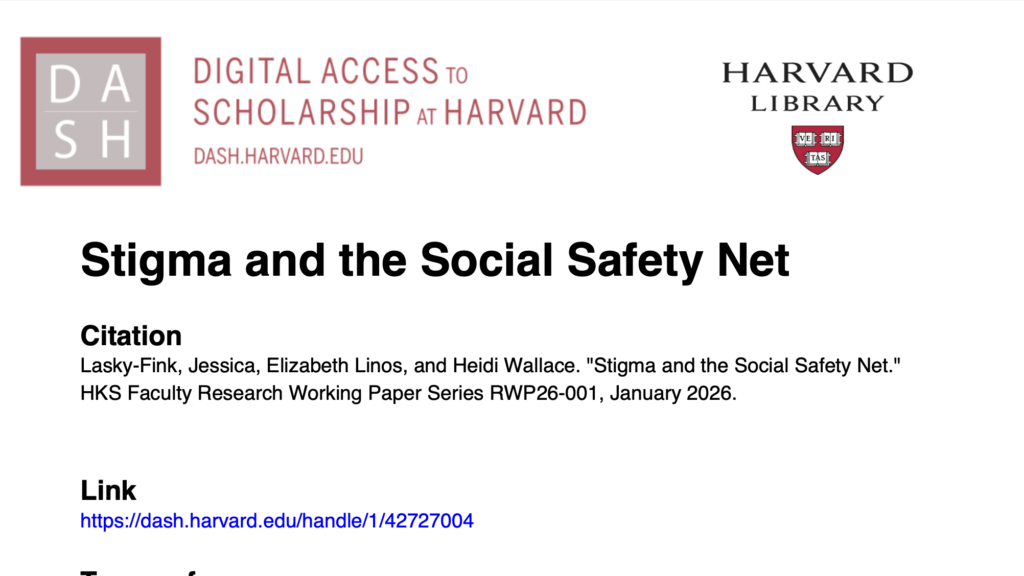Improving Service in Portland and New York: A FormFest 2024 Profile
A profile on FormFest speakers Greg Clapp, Josh Gregor, Sophia Tareen, Sourabh Chakraborty, featuring stories about their motivations for working on public sector form innovation.
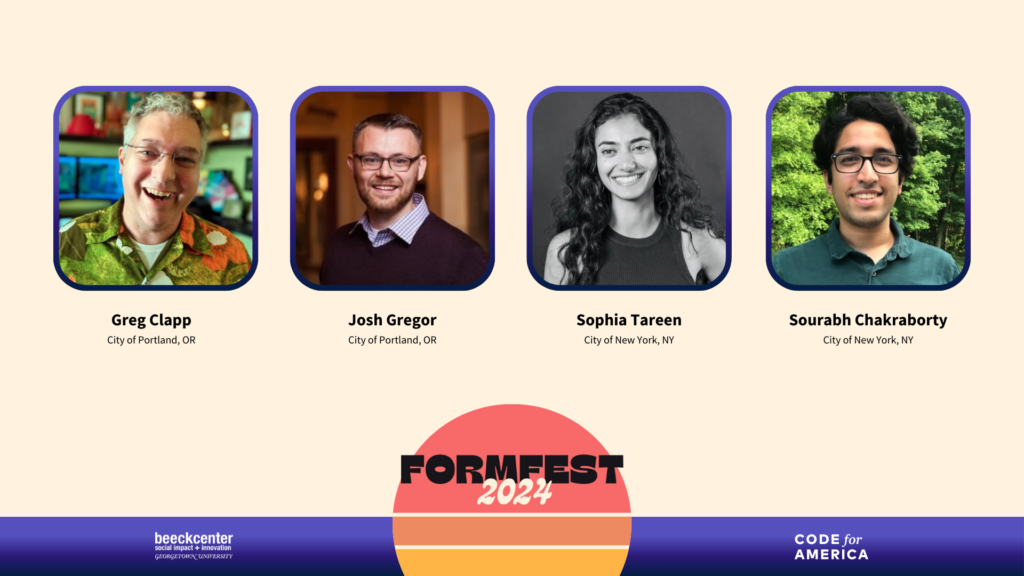
Forms From Coast to Coast
Greg Clapp and Josh Gregor — Flipping the Script in Portland
A simple premise: Residents shouldn’t need an organizational flowchart to find answers on a government website. Josh Gregor and Greg Clapp embraced that concept to revitalize the way Portland delivers services, both online (through a streamlined, community-oriented website) and face to face (via a city-wide 311 system implemented in 2020).

Greg Clapp: Tech. Tinkering. Team-building.
Greg Clapp has never not been an engineer. It’s in his blood—both his dad (electrical) and grandfather (aeronautical) were professional tinkerers—but it’s also in his bones in a way he describes as a lifelong desire to “build cool things and make the world better.” At home, that might mean indulging a passion for Tiki culture by constructing an immersive basement lounge, complete with lighting and sound effects. At work, it’s about simplifying interactions between residents and government, with the goal of improving both access and workflow.
Which wasn’t always the plan. Greg began his career in the private sector, building sites and systems for pharmaceutical, tech and finance companies. He’d never considered a move to public service until 2016, when the City of Portland, Oregon, needed to overhaul its website. The project spanned the gamut, from system migration and application development to collaboration with a broad array of stakeholders. All of that spoke directly to Greg, who thrives equally in technical/organizational work and community-building roles. His role has evolved over the past eight years, encompassing an ongoing project to modernize the City’s service request process. The work itself is a dream. But the intangibles are even better.
“I love the fact that my daily job is making the lives of community members easier,” he said. “Look at Cooling Portland, a program that helps get air conditioners to people in need. We created that form, which had thousands of signups in the first week. It is literally saving lives, and that is so gratifying. I love what I do.”
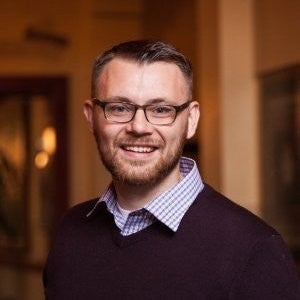
Josh Gregor: Every Time a Bell Rings
Josh Gregor came to Portland, Oregon, on purpose, joining the City in 2013 as a recent college graduate with a longtime goal of working in public service. And, OK, yes, that happened to be when Parks and Rec was a big thing, but the timing was coincidental—Josh knew long before then that he wanted a career in local government. Ask him to describe that desire in pop culture terms, and he’ll veer somewhere else entirely: Bedford Falls, home of the community-minded eternal optimist George Bailey from the perennial feel-good film It’s a Wonderful Life.
Also, maybe a little Portlandia. Because, you know, Portland.
Josh started his career as a revenue and taxation specialist, providing face-to-face and phone-based customer service while also retooling website portals to improve user experience. By 2017, he’d advanced to a senior management analyst role, where he helped launch PDX 311, the City’s first point of contact for community members. The project hinged on a multi-department coalition of stakeholders, all of them committed to advancing the City’s broader goal of making it easier for community members to access government services. After a successful launch in 2022, Josh’s role evolved to continuous improvement coordinator, helping to improve the customer service journey online through streamlining bureaucratic processes and advancing people-centric technology.
“I don’t think we captured lightning in a bottle,” he said. “I think we just had people who were dedicated public servants who wanted and had the tools to effect change.”
Sophia Tareen and Sourabh Chakraborty: Rethinking Form Data Utilization in New York City
Every day, thousands of New Yorkers enter their personal information into forms to access critical public services including assistance for food and housing. It can be a time-consuming, often daunting process—and if you need to access multiple services, you typically have to do it more than once. But what if you didn’t? That’s the idea behind the NYC Benefits Platform, a suite of open-source technologies designed to help service providers use existing form data to assess potential eligibility for dozens of services and benefits residents may not otherwise know they qualify for. The linchpin to that platform: collaboration, according to the NYC Office for Economic Opportunity’s Sophia Tareen, senior product manager, and Sourabh Chakraborty, software engineer.
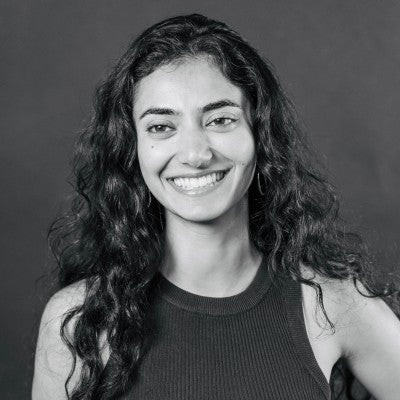
Sophia Tareen: Nothing Exists in a Vacuum
Sophia Tareen has always understood the value of healing. Raised by parents who worked in medicine, she learned at a young age that health outcomes are just one piece of the much larger puzzle of the overall societal condition—and that small changes can make a big difference.
That understanding came to life in a visceral way during the pandemic, when Sophia began helping people in her community fill out applications for public assistance. The process could—and should—be simplified, she thought. Shortly after, amid the ongoing global upheaval, Sophia transitioned from the private tech space to the public sector, working in various civic tech organizations and eventually joining the NYC Mayor’s Office for Economic Opportunity as a senior product manager.
The change was intense, but then, so was everything. In the end, it was less a career move than a call to action.
“It was, ‘I want to help as much as I can with the skillset that I have,’” she recalled. “Still, I felt limited in my abilities. I’m just one person working on this big, complex problem. But it was also really motivating. These are relatively simple tech problems that have been solved in the private sector, and if we can adapt them to a different context, they can have a lot of impact.”
One such problem: The ubiquitous requirement that city residents re-enter their personal information every time they apply for any type of public assistance. What if, instead, residents could opt in to securely sharing their information across the City’s agencies and partners, shifting the burden away from the individual and effectively streamlining the eligibility process into a single event?
The process is ongoing, but early results are promising. The next steps involve scaling the impact of the work, and continuing to balance new forms of data-sharing with informed consent. Every step moves toward the same goal of easing the burdens of the application process to ensure that accessing benefits does not add to what is, in many cases, already a crisis situation for residents.
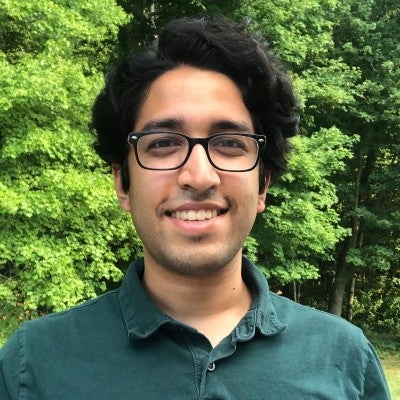
Sourabh Chakraborty: From Star Stuff to Societal Impacts
At first, Sourabh Chakraborty resisted the tech space. His parents both worked in the industry, and as a teen, he felt compelled to chart his own path. Back then, his dream was to become a theoretical physicist who studied the inner workings of the stars. By college, he’d shifted his focus to computer science, with a side of political science. Surely, there was some way to combine the two.
It took a bit to find one. Sourabh didn’t discover the world of civic tech until after graduating from Cornell, when he attended the School of Data during a stint in the private sector (an excellent way to build skills, if not exactly a higher calling). There it was: an opportunity to join a community of tech-minded professionals doing good work to help people.
Sourabh joined the NYC Mayor’s Office for Economic Opportunity in January 2023 as a software engineer, using his programming skills to create websites to help residents get help. The technology for those projects is open-source and available to the public, part of a Citywide commitment to sharing resources with other cities and states in hopes of propagating best practices across jurisdictions.
That dual focus on data and government doesn’t stop at the end of the work day. In his free time, Sourabh analyzes data for Block Party, an archive of transcripts from New York City community board meetings. He’s publicized the code for his own undergrad thesis, which analyzed trends in political language on Reddit, and once took a class on city government to further his work in improving local government.
FormFest Session Abstract & Details
Closing Keynotes & Remarks
Main Stage | December 4, 2024 | 3:45 PM-5:00 PMET
Forms from coast to coast
Sophia Tareen, Sourabh Chakraborty, Josh Gregor, Greg Clapp
Forms are more than just paperwork—they’re a gateway to essential services and a powerful tool for transforming government operations. In this panel, hear from four innovative local government leaders who are leveraging form data to proactively enhance services for residents while streamlining internal processes.
From New York City’s Benefits Platform, which helps residents discover additional services they qualify for using existing form data, to Portland’s customized digital services, which tailor outcomes based on resident needs, these leaders will show how rethinking forms can reduce administrative burdens, improve efficiency, and ensure that people get exactly what they need.
Whether it’s routing information to the right department or delivering targeted solutions, their approaches save time for both residents and staff. Join us for a discussion on modernizing outdated systems and using technology to deliver more effective public services.
FormFest 2024
FormFest is a free virtual event showcasing governments working to make services accessible to everyone through online forms. Discover best practices and tools that are shaping the future of form design and service delivery.

